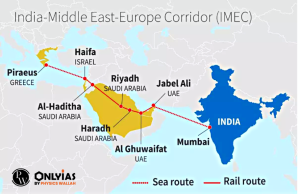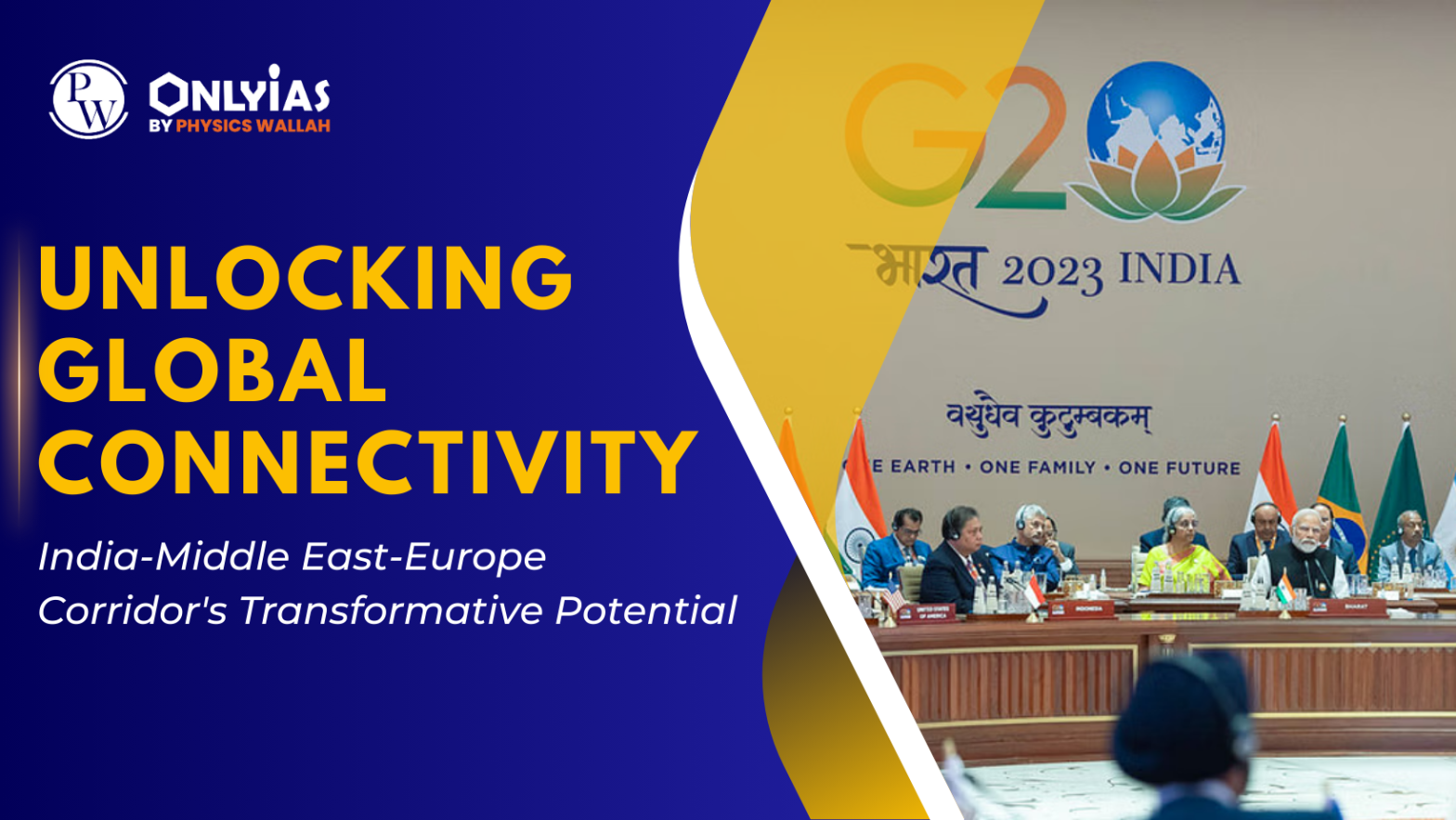Context: This article is based on an Editorial “India-Middle East-Europe corridor to have multiple routes, but hurdles remain” which was published in The Hindu. On the sidelines of the G20 Summit in New Delhi, an MoU was signed between India, the US, Saudi Arabia, the European Union, the UAE, France, Germany, and Italy to establish the India-Middle East-Europe Economic Corridor (IMEE-EC).
| Relevancy for Prelims: India-Middle East-Europe Corridor, Involved Ports and Corridors, and G20.
Relevancy for Mains: India-Middle East-Europe Corridor, its significance and challenges for India and G20. |
Overview of India-Middle East-Europe Corridor:
- Advancing Global Infrastructure for Connectivity: India-Middle East-Europe Corridor will be the part of The Partnership for Rail and Shipping Corridors Global Infrastructure Investment (PGII).
- Focus on Fostering Economic Growth and Diplomatic Collaboration: Enhancing global trade and cooperation through critical infrastructure development.
- Participating Countries: India, Saudi Arabia, UAE, France, Germany, Italy, USA, and EU.
- Comprising Corridors: The India-Middle East-Europe Corridor will comprise Railroad, Ship-to-Rail networks, and Road transport routes spanning two distinct corridors.
- The East Corridor: Facilitating connectivity from India to the Arabian Gulf.
- The Northern Corridor: Facilitating connectivity from the Gulf to Europe.
- The India-Middle East-Europe Corridor will also include an electricity cable, a hydrogen pipeline and a high-speed data cable.

- Ports to be Linked under India-Middle East-Europe Corridor:
- India: Mundra (Gujarat), Kandla (Gujarat), and Jawaharlal Nehru Port Trust (Navi Mumbai).
- Middle East: Fujairah, Jebel Ali, and Abu Dhabi in the UAE, along with Dammam and Ras Al Khair ports in Saudi Arabia.
- The railway line will establish a connection from Fujairah port (UAE) to Haifa port (Israel), passing through Saudi Arabia (Ghuwaifat and Haradh) and Jordan.
Implications of the India-Middle East-Europe Corridor:
-
Geopolitical Implications of IMEC:
- Normalization of Ties: The India-Middle East-Europe corridor’s alignment through Jordan and Israel could support the USA administration’s efforts to solidify the recent normalization of relations between Israel and several Arab states, including the UAE.
- Enhancing Intercontinental Integration: India-Middle East-Europe corridor can bolster connections and integration across different continents and cultures.
- Countering China’s BRI: The IMEC has the capacity to offset China’s increasing economic and political influence, particularly in areas with longstanding connections to the United States.
- Overcoming Pakistan’s Control of Overland Connectivity: The India-Middle East-Europe Corridor circumvents Pakistan, eliminating its veto power over India’s overland connections to the West.
- Strengthening Engagement with the Arabian Peninsula: By creating lasting connectivity and elevating political and strategic relationships with countries in the region.
- India’s Strategic role in Africa: The blueprint of this corridor could be extended to Africa, as a Trans-African corridor. This signifies India’s commitment to bolster its engagement with Africa and contribute to its infrastructure development.
-
Economic Implications of India-Middle East-Europe corridor:
- Industrial Expansion: The India-Middle East-Europe corridor facilitates efficient transportation, promoting industrial growth in areas linked to the corridor.
- Enhanced Trade: The IMEC improves trade links, reduces transit times, making trade with Europe approximately 40% faster than the Suez Canal.
- Employment Generation: With the expansion of economic activities, the growth in trade, infrastructure, and related industries will necessitate both skilled and unskilled labor, thus promoting employment.
- Enhanced Energy Security and Resource Access: Reliable access to these resources will enhance India’s energy security and support its burgeoning economy.
Challenges and Hurdles on the India-Middle East-Europe Corridor Path
- Incomplete Rail Links and Construction Requirements demanding substantial construction efforts and investment to finalize the rail infrastructure.
- Coordinating efforts, policies, and regulations among numerous nations with distinct interests, legal systems, and administrative procedures represents a significant challenge.
- Logistical and Connectivity Challenge as the multimodal transport corridor necessitates intricate logistical planning and coordination among various stakeholders.
- Financial Consideration for the construction, operation, and maintenance of the corridor poses a substantial challenge.
- Preliminary estimates suggest that the development of each India-Middle East-Europe Corridor route could range from USD 3 billion to USD 8 billion.
- Potential Opposition and Competition from existing transportation routes, notably Egypt’s Suez Canal, might experience reduced traffic and revenue, could pose challenges and diplomatic complexities.
Key Considerations for IMEE-EC Success: A Way Forward
- Need of Substantial Efforts: India-Middle East-Europe Corridor has potential but requires substantial effort to become successful.
- Flawless Operation with Uniformity: Ensuring technical uniformity and standardization concerning rail gauges, train technologies, container specifications and other crucial elements among various countries is imperative to ensure flawless operations.
- Balancing of Multiple Interests: Striking a balance among the geopolitical interests of the participating nations and addressing potential political sensitivities, particularly regarding Israel, is pivotal for the successful execution of the project.
Conclusion
- The India-Middle East-Europe Corridor, part of the PGII initiative, holds immense promise for global connectivity, trade, and diplomacy. While it presents geopolitical advantages, overcoming substantial challenges in infrastructure, coordination, and financing is essential. Success hinges on concerted efforts, technical standardization, and delicate diplomacy, offering a path to foster economic growth and intercontinental integration.
![]() 20 Sep 2023
20 Sep 2023
